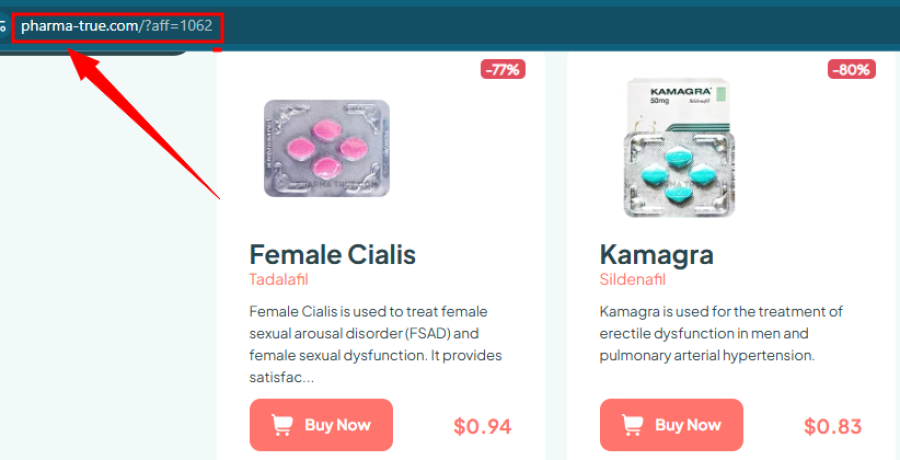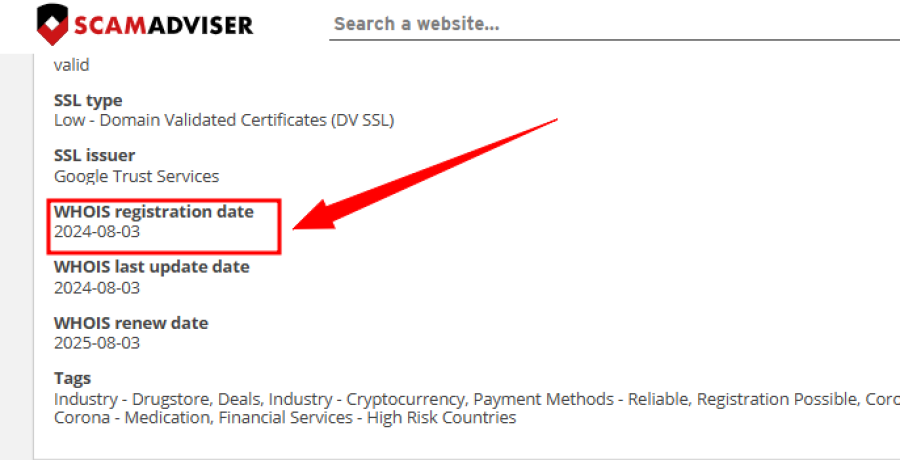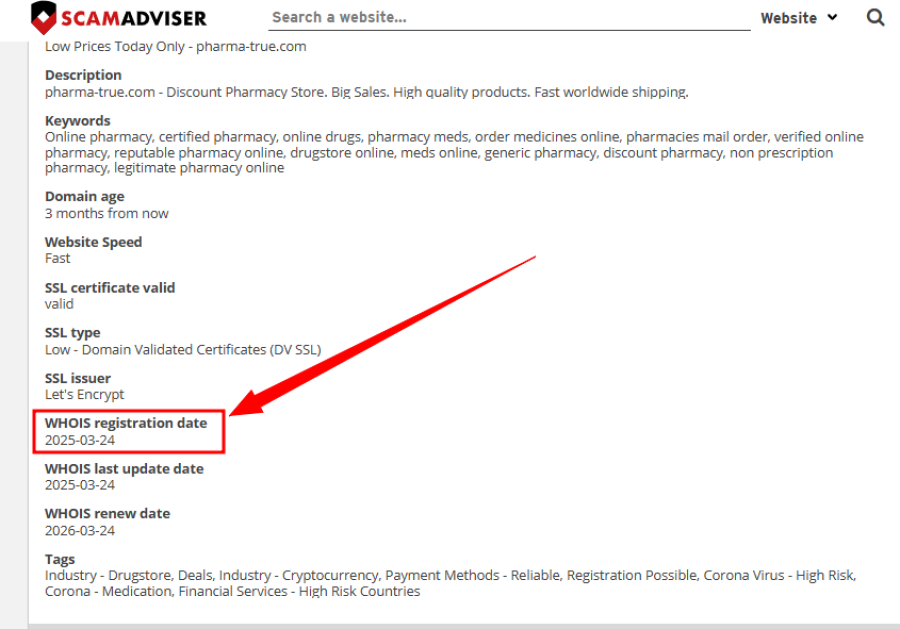Is Citaedtre.com a Scam or Legit?

Author: Adam Collins
Ordering medication online can save you time, money, and a trip to the pharmacy—but it can also cost you far more if you end up on the wrong site. That’s the risk with Citaedtre.com, a website that claims to offer affordable prescription drugs but raises several red flags the moment you start clicking around.
From sudden redirects to questionable reviews and misleading claims about its history, this site may not be what it seems. In this article, we break down the evidence so you can decide: Is Citaedtre.com trustworthy, or just another cleverly disguised scam?
Redirects to Pharma-true.com, Which Is Highly Suspicious
One of the first warning signs with Citaedtre.com is that it doesn’t always stay on its own domain. In many cases, users report being redirected to a completely different site—Pharma-true.com—once they begin browsing or try to make a purchase.

Redirects like this are common tactics in scam operations. They can be used to mask a site’s real intent or location, or to funnel users into a more convincing but still fraudulent platform. If a website you visit suddenly sends you somewhere else—especially when it involves sensitive data like prescriptions or payment information—that’s a serious red flag.
Citaedtre.com's Questionable Reviews
Citaedtre.com features a long list of glowing testimonials on its homepage, all praising the site’s fast delivery, great service, and cheap medication. But there’s a problem: these reviews can’t be independently verified.

When we checked third-party sites like Trustpilot, SiteJabber, and other well-known review platforms, we found no reviews at all—good or bad. In the world of e-commerce, especially for something as sensitive as medication, that’s very unusual. Most legitimate businesses have at least a handful of user reviews across multiple platforms. The absence of external feedback raises serious concerns about transparency and credibility.
When Were They Registered?
According to their homepage, Citaedtre.com claims to have over 20 years of experience in the online pharmacy industry. This kind of statement is meant to build trust with visitors. However, when we conducted a Whois domain lookup and reviewed information from ScamAdviser, we found a completely different story.


- Citaedtre.com was registered in 2024
- Pharma-true.com (the site it redirects to) was registered in 2025
This is a major discrepancy. If a company is new to the internet, that’s not necessarily a bad thing. But claiming two decades of experience while being just a few months old is dishonest, and it undermines any credibility the site might have had.
Bottom Line: Is Citaedtre.com ( Pharma-true.com) a Scam?
While Citaedtre.com tries to present itself as a trusted source for online medication, the warning signs are hard to ignore:
- The site redirects to another, newly registered domain
- It posts unverifiable reviews with no third-party validation
- It falsely claims 20 years of experience despite only being online since 2024
These aren’t minor inconsistencies—they’re indicators of a site that may be hiding its true identity and purpose.
If you’re considering purchasing medication online, it’s best to stick with reliable, reputable, and licensed online pharmacies. Always verify a site’s registration, read real user reviews on platforms like Trustpilot, and avoid any website that makes exaggerated claims or redirects to unknown pages.
In conclusion, Citaedtre.com appears risky and should be approached with extreme caution. When it comes to your health—and your money—there’s no room for guesswork.
Before you click, check with ScamAdviser.com—it’s a quick way to verify websites, phone numbers, crypto wallets, and even IBANs. On mobile? No worries—the ScamAdviser app has you covered 24/7, keeping you safer wherever you browse.
This article has been written by a scam fighter volunteer. If you believe the article above contains inaccuracies or needs to include relevant information, please contact ScamAdviser.com using this form.
Report a Scam!

Have you fallen for a hoax, bought a fake product? Report the site and warn others!
Scam Categories
Help & Info
Popular Stories
As the influence of the internet rises, so does the prevalence of online scams. There are fraudsters making all kinds of claims to trap victims online - from fake investment opportunities to online stores - and the internet allows them to operate from any part of the world with anonymity. The ability to spot online scams is an important skill to have as the virtual world is increasingly becoming a part of every facet of our lives. The below tips will help you identify the signs which can indicate that a website could be a scam. Common Sense: Too Good To Be True When looking for goods online, a great deal can be very enticing. A Gucci bag or a new iPhone for half the price? Who wouldn’t want to grab such a deal? Scammers know this too and try to take advantage of the fact. If an online deal looks too good to be true, think twice and double-check things. The easiest way to do this is to simply check out the same product at competing websites (that you trust). If the difference in prices is huge, it might be better to double-check the rest of the website. Check Out the Social Media Links Social media is a core part of ecommerce businesses these days and consumers often expect online shops to have a social media presence. Scammers know this and often insert logos of social media sites on their websites. Scratching beneath the surface often reveals this fu
So the worst has come to pass - you realise you parted with your money too fast, and the site you used was a scam - what now? Well first of all, don’t despair!! If you think you have been scammed, the first port of call when having an issue is to simply ask for a refund. This is the first and easiest step to determine whether you are dealing with a genuine company or scammers. Sadly, getting your money back from a scammer is not as simple as just asking. If you are indeed dealing with scammers, the procedure (and chance) of getting your money back varies depending on the payment method you used. PayPal Debit card/Credit card Bank transfer Wire transfer Google Pay Bitcoin PayPal If you used PayPal, you have a strong chance of getting your money back if you were scammed. On their website, you can file a dispute within 180 calendar days of your purchase. Conditions to file a dispute: The simplest situation is that you ordered from an online store and it has not arrived. In this case this is what PayPal states: "If your order never shows up and the seller can't provide proof of shipment or delivery, you'll get a full refund. It's that simple." The scammer has sent you a completely different item. For example, you ordered a PlayStation 4, but instead received only a Playstation controller. The condition of the item was misrepresented on the product page. This could be the